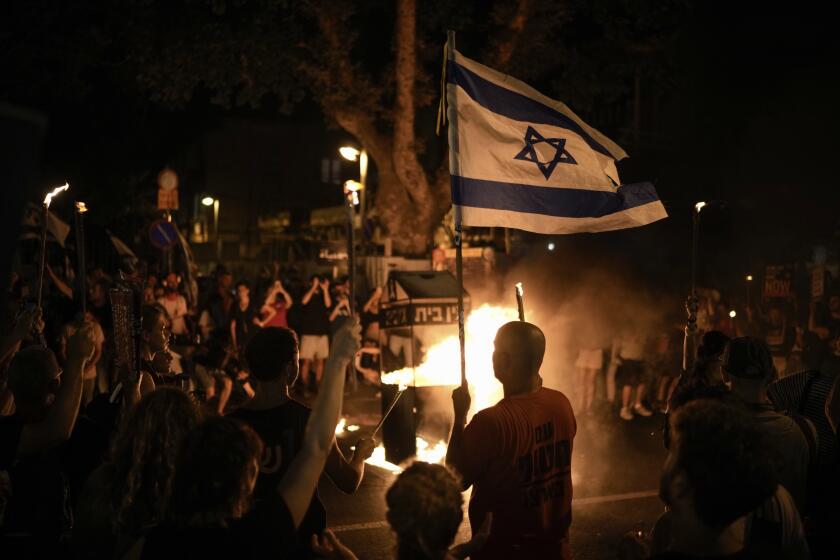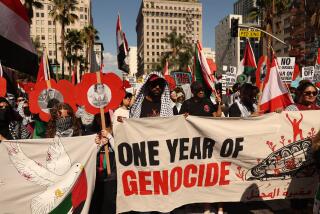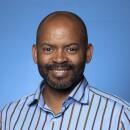Protest violence outside L.A. synagogue spurs widespread condemnation. Bass vows quick action
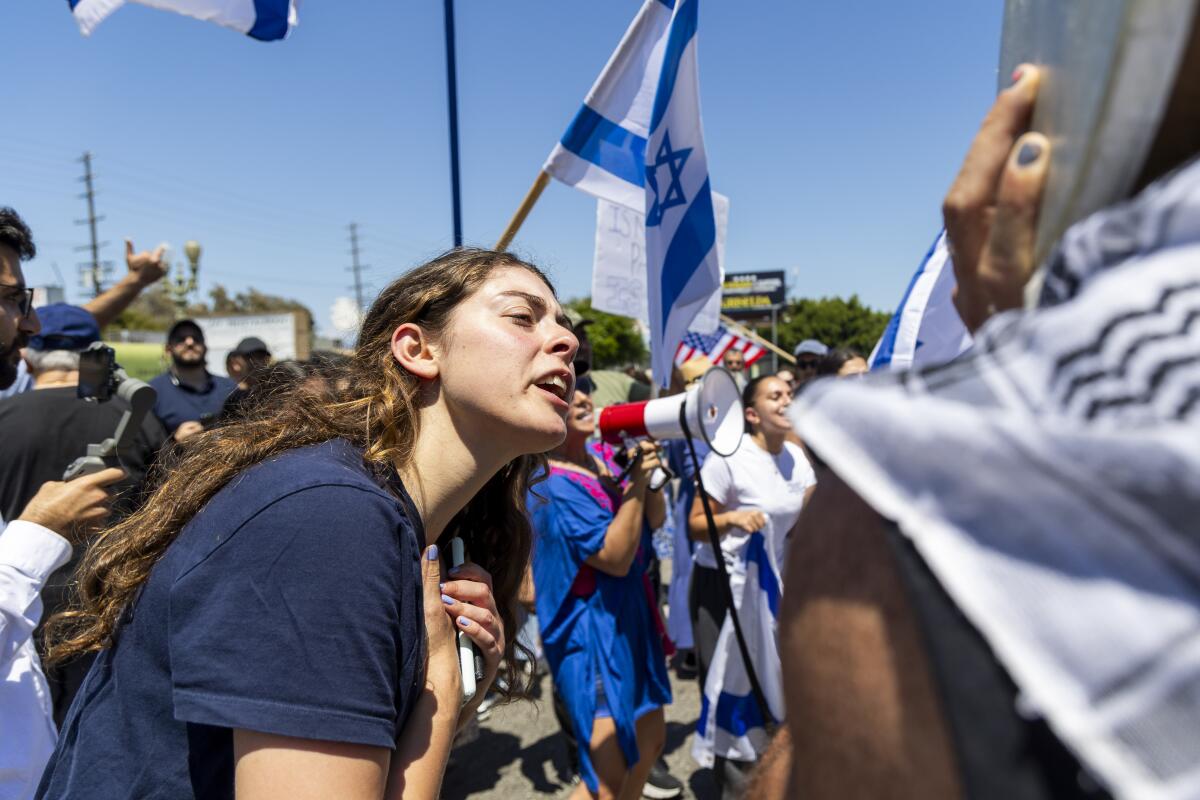
A violent protest outside a Los Angeles synagogue sparked condemnation from President Biden and others Monday and prompted new debate over what some consider escalating behavior during demonstrations over the war in Gaza.
The protest began Sunday afternoon at the Adas Torah synagogue in the heavily Jewish Pico-Robertson neighborhood but eventually spilled into nearby areas over several hours. Fights broke out between pro-Palestinian demonstrators — who said they were protesting an event at the synagogue promoting the sale of stolen Palestinian land — and supporters of Israel.
Law enforcement sources said more than 150 people converged on the temple on West Pico Boulevard, and it took time for the Los Angeles Police Department to get enough personnel to the scene. The LAPD eventually deployed 60 officers and got the protesters and counterprotesters to clear the area, according to the sources, who spoke on the condition of anonymity because they were not authorized to speak publicly.
A pro-Israeli demonstrator who was carrying a sharp pole was arrested, according to the sources. LAPD officials said they were also investigating two reports of battery.
Bass ordered the LAPD to beef up patrols in the area and at some religious venues.
Los Angeles Mayor Karen Bass said the protest had “cast a shadow of fear,” not just in the Pico-Robertson neighborhood — “the heart of one of our Jewish communities” — but also “regionally and nationally.”
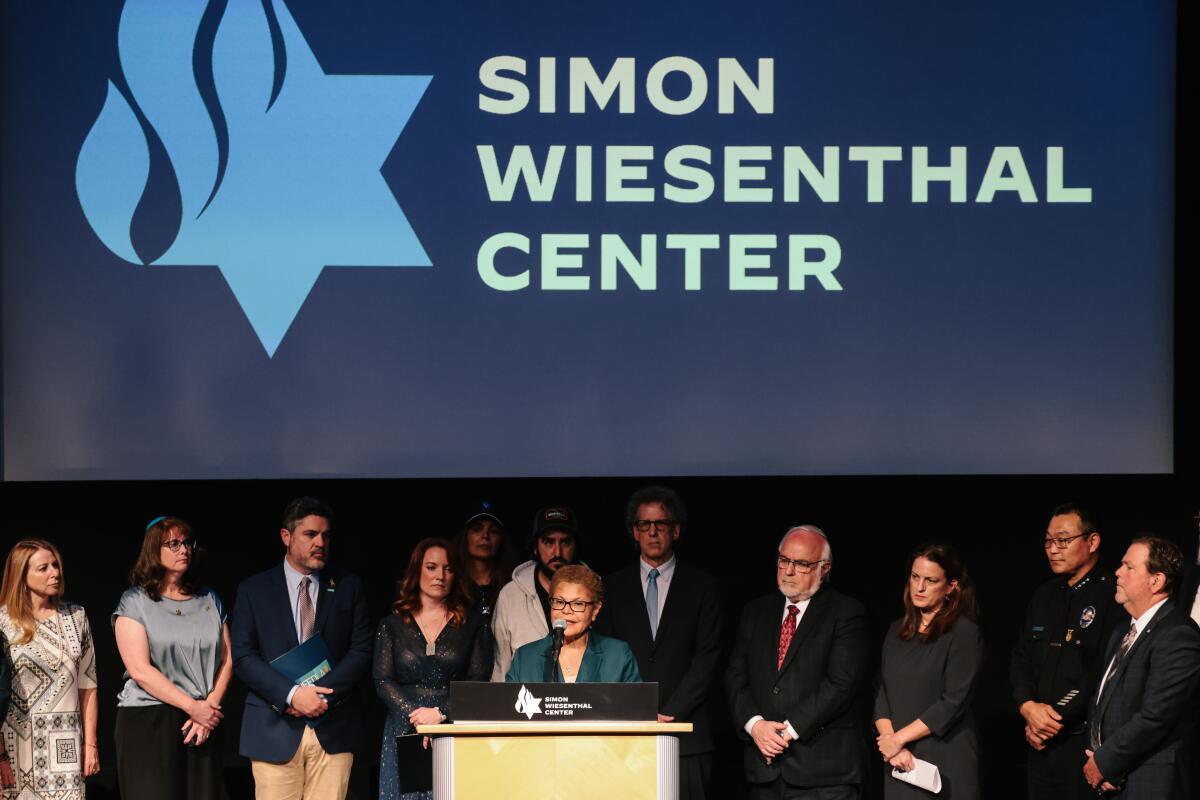
The mayor, at a Monday afternoon news conference at the Museum of Tolerance, vowed to take quick action, including seeking city and state funding for additional security measures at places of worship in the city, as well as examining the rules governing demonstrations, including “the idea of people wearing masks at protests.” A number of pro-Palestinian protesters had their faces covered Sunday.
“Yesterday was abhorrent, and blocking access to a place of worship is absolutely unacceptable,” Bass said at the news conference. “This violence was designed to stoke fear. It was designed to divide. But hear me loud and clear: It will fail.”
The demonstration was also criticized by Biden, Vice President Kamala Harris and California Gov. Gavin Newsom.
“Intimidating Jewish congregants is dangerous, unconscionable, antisemitic, and un-American,” the president said in a statement. “Americans have a right to peaceful protest. But blocking access to a house of worship — and engaging in violence — is never acceptable.”
Hussam Ayloush, the executive director of the Council on American-Islamic Relations office in Los Angeles, said the site of the demonstration was chosen not because it was in front of a Jewish temple but because of the event it was hosting.
The protest “was in response to the blatant violations of both international law and human rights from agencies that seek to make a profit selling brutally stolen Palestinian land as the Israeli government continues its eight-month-long genocidal campaign and ethnic cleansing in Gaza,” he said in a statement.
The law enforcement sources said the event was advertised in Friday’s issue of the Jewish Journal promising to provide information on “housing projects in all the best Anglo neighborhoods in Israel.” “Anglo” is a direct translation from Hebrew meaning “English-speaking.” The ad does not specify where in Israel the real estate is.
Protest fliers posted on social media said, “Our Land Is Not For Sale,” and condemned “land theft,” according to an Instagram post from the Southern California chapter of the Palestinian Youth Movement, which did not immediately respond to requests for comment Monday.
“Elected officials and the mainstream media have politicized this incident as religious discrimination as opposed to a human rights issue,” Ayloush said. “We call on political leaders to condemn the organizations involved in the potentially illegal sale of Palestinian land and the counter-protesters who commit violence against anti-genocide protesters with the same fervor used for rightfully condemning antisemitism.”
Rabbi Yossi Eilfort was at the synagogue with his security group Magen Am after Jewish community members notified them about the planned protest, Eilfort said. Sunday’s protest was only the second time Eilfort could recall a protest taking place outside a synagogue since Oct. 7, when a group gathered outside the Shaarey Zedek synagogue and Hebrew school in Valley Village.
The protesters arrived in waves that overwhelmed LAPD officers on the scene, Eilfort said. At one point, Eilfort said he saw a masked protester use some type of irritant spray on Jewish counterprotesters.
“They came with weapons in order to escalate and create violence,” he said. “They have the right to protest. We have the right to hold an event that was in our community.”
It was not clear how many people were injured.
Videographer Sean Beckner-Carmitchel said he was hit in the back of the head by pro-Israel protesters while he covered the event. Several men followed him on Pico Boulevard shortly before 4:30 p.m. In his video, someone off camera can be heard telling the men that Beckner-Carmitchel is a member of the media.
“It was nothing other than egging on violence,” he said. “There were no political statements being made.”
Interim LAPD Chief Dominic Choi said authorities knew about the protest in advance and based their deployment strategy on the size of the groups they’d seen at similar gatherings.
A demonstration at a synagogue in Valley Village on Thursday brought only 25 protesters. A handful of officers was enough to handle that crowd, according to law enforcement sources.
Based on that assessment, Choi said, the department initially deployed two squads of officers to the synagogue.
But Sunday’s gathering was much bigger.
Choi declined to say how many officers were eventually called to provide backup, saying only that it was “over a mobile force.”
Eden Cohen said a handful of LAPD officers were standing at the entrance of the synagogue, apparently trying to keep protesters from going inside. Her throat and eyes burned from the bear spray that saturated the air, she said, adding that she saw Jewish people on the ground after being sprayed with the irritant as others tried to help them.
There were fistfights among protesters, some of whom fashioned signs into sticks and others who hurled obscenities and wrestled one another to the ground in the street. Cohen said she heard anti-Jewish slurs and calls for violence against Israeli soldiers.
“Police were really not stopping the fights that were breaking out. They weren’t stopping the anti-Jewish protesters from spraying Jews in the face with bear spray. It was a chaotic, violent, terrifying scene that seemed to be completely out of control,” Cohen said.
Bass said in her statement late Sunday that she would be meeting with Choi to discuss security measures and other issues related to the violence. Choi told The Times he would review the department’s response to the protest.
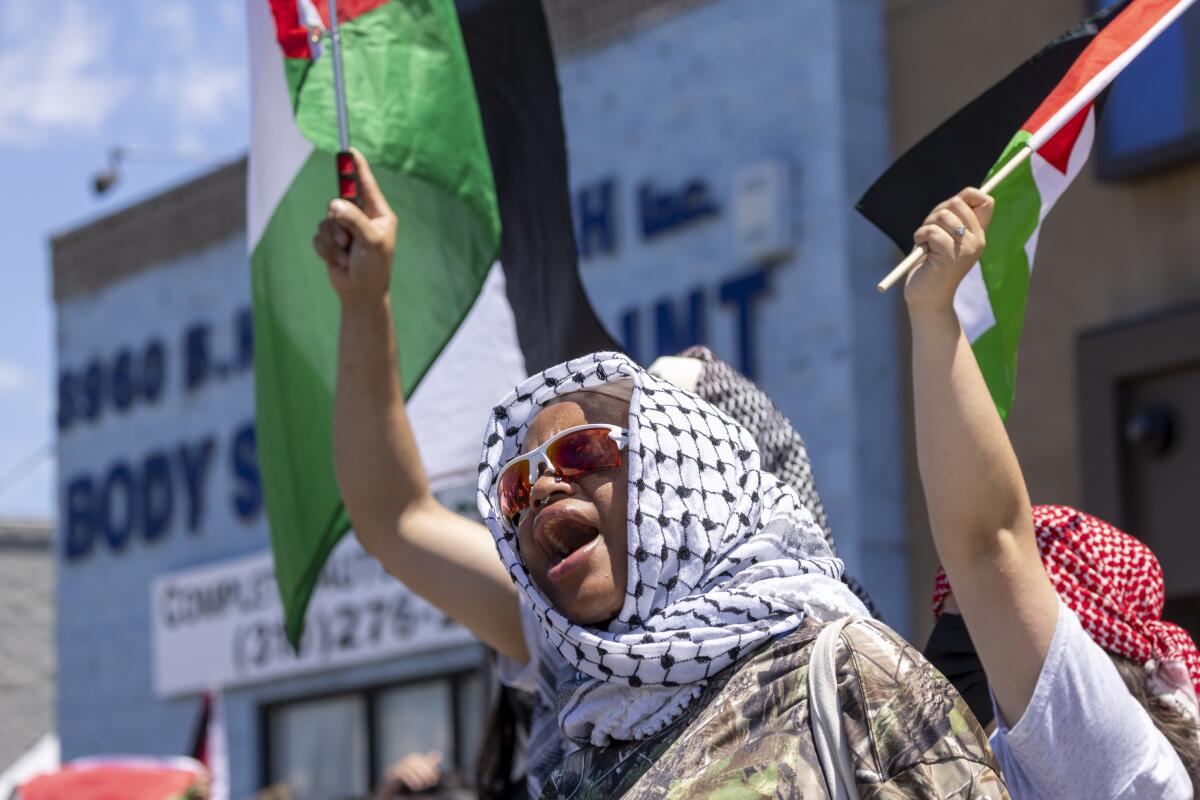
Rabbi Hertzel Illulian, founder of the JEM Community Center in Beverly Hills, arrived at Adas Torah on Sunday to worship during afternoon prayer and was confronted by a group yelling into megaphones. Some temple visitors were blocked from going inside, he said.
“We could not pray well because these people outside were screaming,” he said.
Jessica Hyam, who owns the Little Tichel Lady clothing shop a few doors down from the synagogue, heard about the protest and hired a security guard to stand outside her store. The protest started small and just in front of Adas Torah, but eventually the sidewalk in front of her store was full.
Her security guard ran inside after he was pepper sprayed.
“It’s our home,” Hyam said, “so for them to come into a densely populated Jewish area and to protest here, it doesn’t feel like it’s part of their cause. It just feels like they’re coming and telling us, ‘We’re against you.’”
Phillip Kim, a member of the group People’s City Council, said he was kicked and spit on by pro-Israeli protesters outside the synagogue. The claim that protesters were blocking the entrance to the synagogue with antisemitic intent is false, he said.
“It’s a horrible mischaracterization of what happened,” Kim said. “None of the protest was based on this being a Jewish place of worship. It was solely based on the real estate event, which is morally reprehensible.”
An L.A. resident who requested anonymity because he said he feared reprisals told The Times that he arrived at the protest around noon and saw there were already dozens of police officers there. He was standing at the front line of the pro-Palestinian side when he said 50 to 100 officers started pushing the protesters, first with their hands and then with their batons.
The protester said he was hit repeatedly with a police baton on his sternum, the right side of his head and below his neck. He shared photos of his bruises and injuries with a Times reporter.
“One of them pushed my face, and I lost my sunglasses and ripped my mask,” he said of the police response. “They were yelling at us to leave the area and move, but we didn’t hear a dispersal order of any kind.”
The pro-Palestinian protesters, pushed to an adjacent street, were told to leave the neighborhood by the pro-Israeli protesters, he said. But when a group tried to leave, he said they were chased by pro-Israel counterprotesters, some wearing tactical gear. He said pro-Palestinian protesters were pushed, punched and slapped.
The man said he saw pepper spray being used by individuals from the pro-Israeli side, prompting protesters from the pro-Palestinian side to use pepper spray in self-defense.
Israeli Prime Minister Benjamin Netanyahu doubles down on his claim of a drop in U.S. weapons deliveries for Israel’s war effort in Gaza, underscoring strains between the allies.
The ongoing war in Gaza, which was sparked by Hamas’ Oct. 7 attack in southern Israel that killed about 1,200 people, has spurred numerous protests across the U.S., pitting pro-Palestinian demonstrators against supporters of Israel.
Although the U.S. has staunchly supported Israel’s aims of freeing hostages taken into Gaza and defeating the militant group Hamas, it has grown increasingly concerned over the rising Palestinian death toll and the humanitarian crisis created by the war.
More than 37,000 Palestinians are dead after nearly nine months of Israeli bombings and a ground invasion of Gaza, according to the Health Ministry in the Hamas-ruled territory. Philippe Lazzarini, commissioner-general of the United Nations Relief and Works Agency for Palestine Refugees in the Near East, said more than 625,000 children are “living in rubble” without access to resources, according to a news release.
The conflict also has fueled a rise in bias crimes in the U.S. against both Jewish and Muslim Americans, according to the Anti-Defamation League.
Antisemitic attacks jumped 140% to 8,873 incidents in 2023, the highest number since the Jewish civil rights advocacy group started tracking data in 1979. The majority of those acts of harassment, vandalism and assault took place after the war began, according to an ADL report released in April.
Anti-Muslim attacks surged 56% in 2023, with nearly half of the more than 8,000 complaints occurring in the last three months of the year, according to the Council on American-Islamic Relations.
Los Angeles Councilwoman Katy Yaroslavsky promised to hold a community meeting in the coming days to probe the situation and called the protest outside the synagogue “deeply concerning.”
“The antisemitic violence that broke out this afternoon in Pico Robertson would have been completely unacceptable anywhere in Los Angeles, but that it was planned and carried out in front of a synagogue in the heart of LA’s Jewish community should be deeply concerning to us all,” Yaroslavsky said in a statement following Sunday’s protests.
Sam Yebri, who watched the situation outside the synagogue Sunday, said targeting places of worship appeared to him to be a new level of escalation by protesters. Yebri’s family prays, eats and shops in the Pico-Robertson community and his children attend school there, he said.
He arrived outside Adas Torah around 1 p.m. and saw protesters wearing masks and green headbands chanting, “Intifada,” the Arabic word for a rebellion. He said he saw protesters making the Nazi salute at Jewish people wearing yarmulkes and holding Israeli flags. But The Times could not confirm that based on videos reviewed from the scene.
“There’s a reason why these protesters chose Pico-Robertson for their actions: They knew they would be striking at the heart of Jewish America,” Yebri said.
The pro-Palestinian protester who asked not to be identified said that although he didn’t see anyone raising the Nazi salute, he confirmed the usage of the word “Intifada” as a “general phrase for Palestinian resistance.”
With tensions running high over the war, city officials made their support of the Jewish community in the incident of Sunday’s protest clear Monday in a setting rich with symbolism.
Inside the Museum of Tolerance, life-size displays lead visitors through the persecution and systematic killing of 6 million Jews during the Holocaust, as well as exhibits about civil rights.
The protest sparked public soul searching among religious leaders and elected officials alike during the news conference.
“We’re actually at a decision point, a decision point where this country needs to decide whether or not it will support the Jewish community, whether or not this country will take a different path than every other country in the history of the world, to decide that this is a place for safety and security for the Jewish people,” said Rabbi Noah Farkas, president and chief executive of the Jewish Federation of Greater Los Angeles.
Rep. Sydney Kamlager-Dove, a Los Angeles Democrat who represents California’s 37th Congressional District, said Sunday’s events should serve as wake-up call specifically for L.A.
“Right now, our community is suffering from a plague of darkness and disconnection,” said Kamlager-Dove, whose district includes the Pico-Robertson neighborhood. “The only way to come out of that darkness is to come together through real action and meaningful connection, which may include having uncomfortable conversations. It certainly includes listening more than talking.”
Times staff writer Paul Pringle and editor Carlos Lozano contributed to this report.
More to Read
Sign up for Essential California
The most important California stories and recommendations in your inbox every morning.
You may occasionally receive promotional content from the Los Angeles Times.
